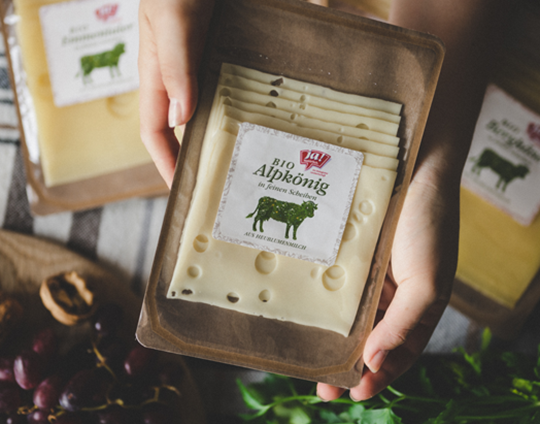Inside BENEO’s new pulse plant: pioneering sustainable protein from faba beans
In Austria, these can be recycled as waste paper because they are made of 80% virgin fibre and only 20% plastic
REWE Group, one of the biggest retailers in Austria, is packing its premium cheese products of its organic brand Ja! Natürlich with a new patented solution from packaging and paper group, Mondi. The Austrian retail stores BILLA, MERKUR, ADEG and Sutterlüty are offering the organic cheese slices on natural brown paper trays.
In Austria, these can be recycled as waste paper because they are made of 80% virgin fibre and only 20% plastic. The new packaging reduces plastic consumption by 70% and carbon footprint by around two-thirds compared with the previous solution.
Sustainability affects all aspects of life. More and more people are looking for environmentally-responsible solutions and expect companies to deliver products that conserve the planet’s resources. In particular, they want to know where products come from and how sustainable the packaging is. Like consumer behaviour, legislation is changing fast – the EU directive on the reduction of single-use plastic is just one example. As a global leader in packaging and paper, Mondi is a pioneer in making packaging sustainable by design.
Markus Gärtner, CEO Mondi Fibre Packaging / Paper said, “We focus on the sustainability of all our packaging and paper products. With a broad range of sustainable product innovations, including our patented paper and barrier solution perFORMing, we are making a valuable contribution to a better world.”
The natural brown paper of the new cheese packaging is produced by Mondi Frantschach, Carinthia, predominantly from Austrian wood. The paper trays are also processed and coated in Austria, by Mondi Zeltweg in Styria. As a consequence, transportation can be kept to a minimum and the added value remains largely within the country’s borders. After a nine-month test phase in cooperation with dairy producer Salzburgmilch, the new packaging will now be used for cheese slices from the delicatessen in the varieties Bio Alpkönig, Bio Gouda, Bio Emmentaler, Bio Butterkäse and Bio Bergkäse. The new paper-based packaging solution will soon be appearing in national supermarket chains in France and Poland as well.
Martina Hörmer, managing director Ja! Natürlich said, “Consumer expectations concerning sustainability in the food industry have changed dramatically over the last couple of years. Our customers are currently taking a keen interest in packaging. Brands such as Ja! Natürlich are expected to act in an environmentally aware manner. Against this backdrop, this topic has been extremely important to us for several years, and we have been gradually switching to more sustainable packaging alternatives since 2011. We are now delighted to have found a solution, together with Mondi, which significantly reduces the product’s carbon footprint, curbs the use of plastic, and is capable of substantially enhancing recyclability.”
Georg Kasperkovitz, CEO of Mondi Consumer Packaging said, “As a producer of both paper and plastic-based packaging, we carefully monitor trends and select the best solutions together with our customers. Mondi’s view is that packaging should always be fit for purpose – paper where possible, plastic when useful. Especially in the food sector, barrier properties are essential to ensure that products are durable and remain fresh. In this context in particular, as an integrated supplier, we can create tailor-made solutions and thus accomplish a major step towards a sustainable society.”
Switching from conventional packaging to paper-based solutions delivers multiple benefits. First, paper has the lowest carbon footprint of all packaging types, and second, it is recyclable, with paper recycling rates across Europe already at over 80%-this is higher than any other packaging material. The EU and consumers are increasingly demanding solutions that are more readily recyclable and more sustainable. According to a 2018 survey in Austria, around 50% of consumers seek to avoid plastic packaging as much as possible. It is clear that brand manufacturers and packaging companies will face huge changes in the future.

